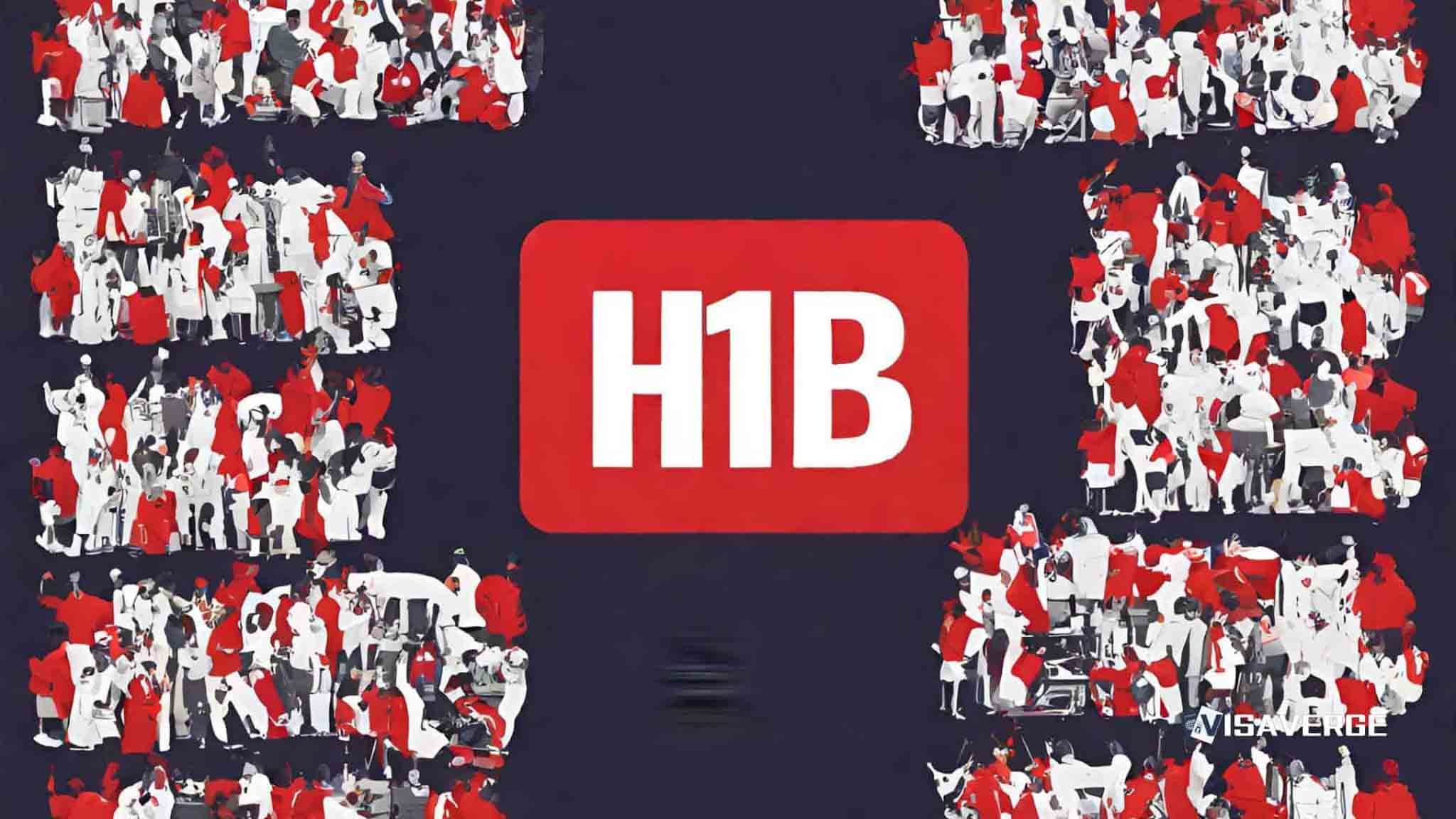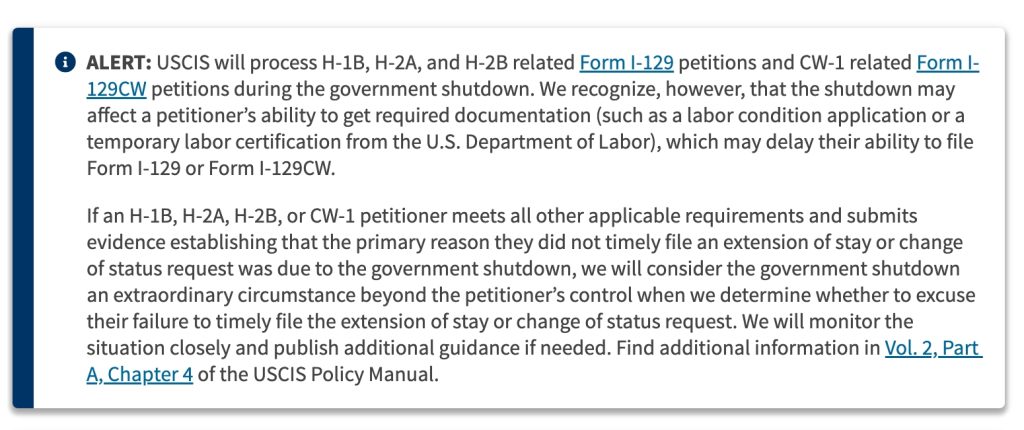(U.S. Citizenship and Immigration Services) U.S. Citizenship and Immigration Services will keep processing employment petitions that rely on Form I-129 during the current government shutdown, but employers should expect filing hurdles tied to missing documents from the Department of Labor. USCIS confirmed that it will continue handling H-1B, H-2A, and H-2B Form I-129 filings and CW-1 petitions filed on Form I-129CW, even while some other federal functions are paused. The agency also said it may excuse late extension or change-of-status filings when the shutdown is the main reason for delay and all other requirements are met.
Immediate bottleneck: Department of Labor documents

The most immediate pressure point involves Labor Condition Applications (LCAs) for H-1B and temporary labor certifications for H-2A and H-2B, which are issued by the Department of Labor (DOL). When the DOL’s online systems are inaccessible during a funding lapse, employers may not be able to secure these documents on time.
Without an approved LCA or temporary labor certification, many petitioners can’t complete their Form I-129 packets. That gap can slow filings even though USCIS remains open for processing.
USCIS said it will “monitor the situation closely” and publish more guidance if needed. The late-filing relief matters for workers who may lose status if their employer cannot file on time due to the shutdown. If a petitioner shows that the shutdown was the primary cause of a missed filing deadline, USCIS will treat it as an “extraordinary circumstance” beyond the petitioner’s control when deciding whether to forgive the late filing. That policy applies to H-1B, H-2A, H-2B, and CW-1 extension-of-stay or change-of-status requests.
Where to find official eligibility and form guidance
Employers and workers looking for official eligibility criteria for specialty occupation H-1B roles can review USCIS guidance on who qualifies, wage obligations, and filing steps. USCIS explains these rules on its page for H-1B specialty occupations, including required evidence and general processing notes. For details, see the agency’s overview of H-1B specialty occupation requirements and process.
USCIS also reminds filers that they must use the correct forms and editions. Employers can download Form I-129 for nonimmigrant workers directly from USCIS and check the latest edition date and filing tips. Access the USCIS page for Form I-129 (Petition for a Nonimmigrant Worker). For the Commonwealth of the Northern Mariana Islands program, CW-1 petitions use a different form. Employers should file the CNMI-only petition using the USCIS page for Form I-129CW (CNMI-Only Transitional Worker). These links provide official instructions, fees, and addresses.
Processing continues, but documentation bottlenecks are real
USCIS operates on fees, so it can keep processing petitions during a federal funding lapse. That means H-1B, H-2A, H-2B, and CW-1 petitions can move forward at the agency even while other parts of the federal government are closed.
However, the government shutdown can still affect the timing of those filings because the DOL issues LCAs for H-1B and temporary labor certifications for most H-2A and H-2B cases. If DOL’s Foreign Labor Application Gateway (FLAG) system is offline, employers cannot:
- File new LCAs
- Request prevailing wage determinations
- Submit PERM applications
This creates a chain reaction that starts before a petition ever reaches USCIS.
Here’s how that plays out on the ground:
1. An H-1B employer needs a certified LCA to file Form I-129. If the LCA can’t be filed or certified, the employer must wait, even though USCIS is open.
2. H-2A and H-2B employers rely on DOL-issued temporary labor certifications. If DOL can’t accept or issue those certifications, the petition cannot be completed.
3. CW-1 petitions are filed on Form I-129CW. While DOL issuances are not the same for CW-1, employers still face timing and evidence demands that can be harder to meet during a shutdown.
USCIS says it will consider late filings for extensions or changes of status if the shutdown caused the delay. To qualify for this relief, petitioners must meet all other rules and show evidence that the shutdown was the main reason they could not file on time. If that standard is met, the agency will treat the delay as beyond the petitioner’s control. This approach can help H-1B workers who risk falling out of status through no fault of their own when an employer cannot submit an on-time Form I-129 due to missing DOL approvals.
According to analysis by VisaVerge.com, employers in sectors with tight seasonal windows—such as agriculture under H-2A and hospitality or landscaping under H-2B—face the highest risk during a shutdown because their business cycles don’t pause when federal systems do. A delay in a labor certification can cause a ripple effect on staffing, housing, and start dates, which in turn affects workers and their families.
Practical impacts and steps employers can take now
While USCIS continues intake and adjudication, the safest approach is to plan for DOL processing gaps and prepare packets so they can be filed the moment DOL systems return. Employers and attorneys report that a few basic steps can reduce harm in a shutdown cycle:
- Build a complete draft packet
- Keep the entire
Form I-129orForm I-129CWpetition ready with all supporting documents that don’t depend on DOL systems. - Include evidence of the job, company ability to pay, worker’s degrees, and prior status history.
- When DOL resumes, plug in the certified LCA or temporary labor certification and file without delay.
- Keep the entire
- Track evidence to prove “extraordinary circumstance”
- Keep records showing FLAG system downtime, error messages, and date-stamped attempts to file.
- Maintain emails with counsel, screenshots, and internal notes explaining why the petition could not be filed on time due to the government shutdown.
- That documentation will help show USCIS the shutdown was the primary reason for the missed deadline.
- Coordinate start dates and I-94 expirations
- Map out worker status end dates and I-94 expirations.
- Consider whether premium processing (where eligible) after filing could offset earlier delays.
- Timing around status validity remains critical even with continued USCIS processing.
- Communicate early with workers and families
- Status gaps create stress, especially for H-1B families with school-age children.
- Clear updates help workers plan housing, travel, and childcare while waiting for DOL systems to reopen and petitions to be filed.
- For CW-1 petitions, verify CNMI program rules
- CW-1 is a transitional program with its own cap and timelines.
- Ensure you’re using Form I-129CW, confirm cap availability, and plan for timing bottlenecks tied to local hiring needs.
- Employers in the CNMI often have narrow recruitment windows, making shutdown timing especially tough.
Brief primer on the categories
- H-1B: Specialty occupations that usually require a bachelor’s degree or higher in a specific field. Typically requires an approved LCA before filing
Form I-129. - H-2A: For seasonal agricultural work. Relies on DOL-issued temporary labor certifications.
- H-2B: For seasonal or peak-load nonagricultural work. Also generally depends on DOL certifications.
- CW-1: CNMI-only transitional worker program. Uses Form I-129CW and focuses on CNMI-specific labor needs and caps.
Each path has different proof and timing requirements, with H-1B and H-2 programs typically hinging on DOL documents before a petitioner can file Form I-129. CW-1 petitions stand somewhat apart because they use Form I-129CW and focus on CNMI needs.
Premium processing and worker options
USCIS has not suspended premium processing for these categories purely due to the shutdown, but premium processing does not fix missing DOL prerequisites. It can speed a decision once a complete filing reaches the agency. Employers should weigh the cost against the business need for a faster answer.
Workers worried about lapses should talk with their employers and counsel about bridge filings and whether they might fit within USCIS’s “extraordinary circumstance” path if the sole reason for delay is the shutdown. Remember: USCIS’s relief applies to extension-of-stay and change-of-status requests that meet all other rules and where the government shutdown is the primary cause of a missed deadline—not a general hardship claim.
Current status and what to watch
The government shutdown began on Oct. 1 after funding lapsed, and Congress continues to seek a deal. During this period, routine business needs do not pause, and neither do family commitments. A missed paycheck or a delayed start date can upend budgets and plans, especially for workers who moved across the country to accept a job offer. In the CNMI, where CW-1 workers fill essential roles, even short pauses can leave hospitals, hotels, and construction sites short of staff.
Employers should also watch for USCIS updates. The agency has said it will issue more guidance if needed. When new instructions arrive, they often include filing flexibility, address updates, or clarifications about evidence standards tied to the shutdown. Keeping a close eye on official channels helps prevent avoidable rejections or Requests for Evidence.
For detailed H-1B program rules, including who qualifies as a specialty occupation worker and what evidence to include, review USCIS’s official H-1B program page. For forms, go to the official Form I-129 page and the official Form I-129CW page to confirm current editions, filing fees, and lockbox addresses before you send anything.
Bottom line
USCIS remains open and will keep processing Form I-129 and CW-1 petitions, but many employers cannot file without DOL-issued pieces. Where the shutdown is the primary reason for a missed extension or change-of-status deadline, USCIS may excuse the delay if all other criteria are met.
Until funding is restored, advance preparation, careful recordkeeping, and steady communication give employers and workers the best chance to protect status and jobs in the United States 🇺🇸.
Frequently Asked Questions
This Article in a Nutshell
USCIS will continue adjudicating Form I-129 and CW-1 petitions for H-1B, H-2A, H-2B and CNMI workers during the government shutdown, but a key constraint is the Department of Labor’s role. DOL issues Labor Condition Applications for H-1B and temporary labor certifications for H-2A and H-2B; if FLAG and other DOL systems are offline, employers cannot secure required documents, halting many filings before they reach USCIS. The agency may excuse late extension or change-of-status filings when the shutdown is the primary cause and petitioners meet all other requirements, treating delays as extraordinary circumstances. Employers should prepare complete petition packets in advance, document downtime and filing attempts, coordinate start dates and I-94 expirations, and maintain clear communication with affected workers. Premium processing speeds decisions but does not replace missing DOL approvals. Monitor USCIS updates, preserve evidence of FLAG outages, and consult counsel to reduce risk during funding lapses.













